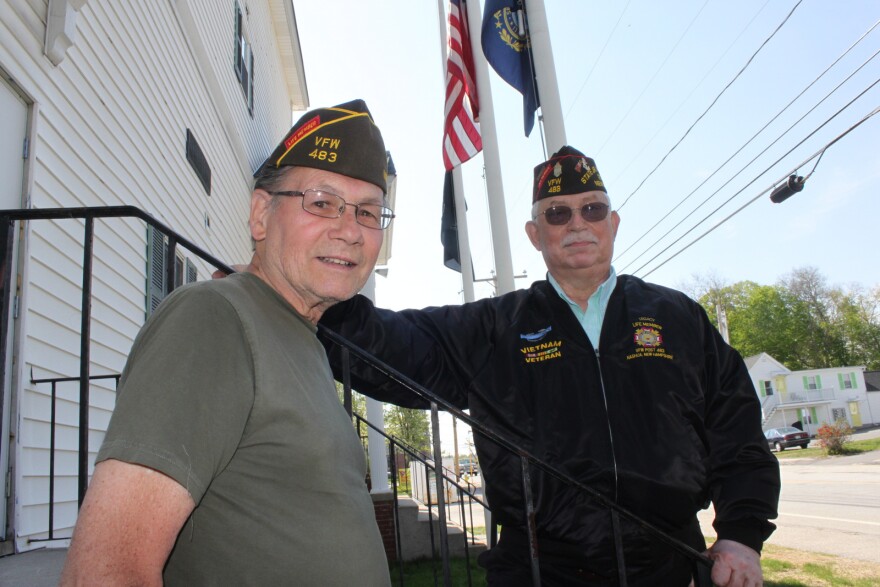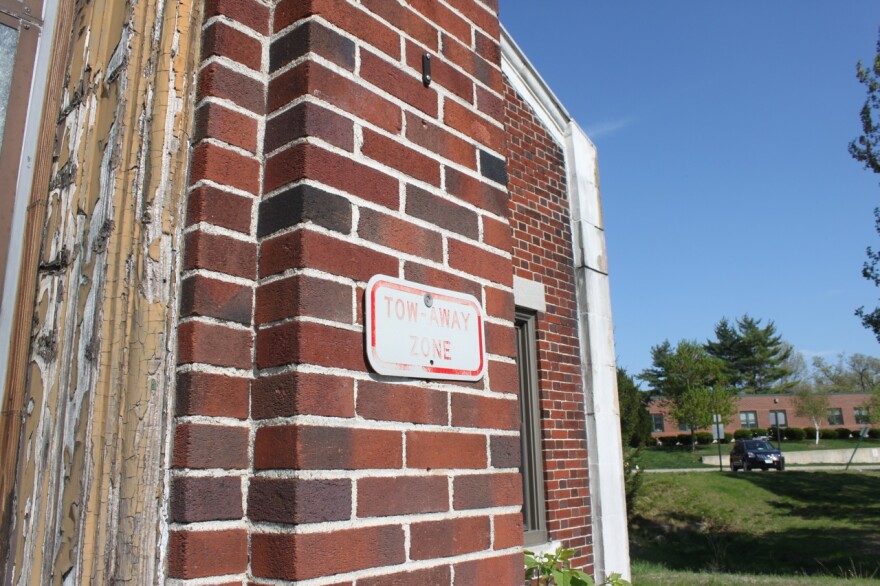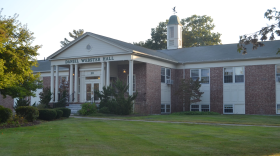It's been more than a year since the flag was lowered for the last time outside VFW Post 483 on Quincy Street in Nashua. But upkeep on the nearly century-old building was breaking the organization's bank, especially after sinking $100,000 into a new sprinkler system in 2012 to comply with the city's building code.
So last April, rather than dig themselves into a bigger financial hole, the VFW sold the building and handed over the keys to the Nashua Soup Kitchen and Homeless Shelter, which was operating across town out of a much smaller building.
Both Lew Chipola and Barry Palmer are optimistic about the future of Post 483, despite it not having a permanent place to call home. Both have served as officers for the post, and they know securing a new building will be an uphill battle. But these war veterans aren't waving any white flags yet.
Moving out of Quincy Street was a difficult decision to make, says Chipola, but for practical reasons beyond the building's condition, it was time for change.

"We have more than 200 life members, but a lot of them are elderly. For health reasons, they can't participate any longer. We have about 25 who come out to meetings. That's why we're trying to bring in younger people," says Chipola.
A permanent home makes it easier for those interested in joining Post 483 to find them, says Palmer. He also says it helps the post to raise the money used to assist local veterans and their families.
Post 483 is one of the state-wide network of posts organized under VFW New Hampshire. In addition to fundraising for the VFW relief fund through sales of poppies made by disabled veterans, VFW New Hampshire employs a service officer charged with securing money for veterans. VFW's around the country also support the National Home for Children in Eaton Rapids, Mich., which provides housing, counseling and other services for families of veterans.
"Just last weekend we got a call from a widow of a vet who died. She said she couldn't afford the funeral services, so we're helping her out," Palmer says.
"There's so much we do, locally and at the state level, that people don't realize. We're not just a bunch of drunken bums sitting around at the canteen."
There's so much we do, locally and at the state level, that people don't realize. We're not just a bunch of drunken bums sitting around at the canteen.
Unfortunately for Nashua's veterans, that very perception may prevent them from relocating to a city-owned building that is available, but for now, remains out of reach.
Shortly after moving out of their Quincy Street building, Nashua Mayor DonnaleeLozeau wondered if the old Arlington Street Fire Station might be a good fit for the veterans. It has been languishing for several years, and would need significant work. But the city, which has been unable to sell the building, expressed willingness to work something out with them.
However, there was immediate push back from the community when word circulated that the VFW might be moving to the neighborhood. The building is an actual stone's throw from Dr. Norman W. Crisp Elementary School.
About 20 residents showed up for a neighborhood meeting held in March, most speaking against the move, citing concerns about drinking on the premises in an otherwise drug-free school zone.
Resident Paul Stevens, who lives directly across the street from the school and fire station, says he didn't make the meeting. But he says if he had to choose between the veterans and the kids, he'd go with the kids.

"It's such a rock and hard place situation. I appreciate what they've done for us, and I completely support our veterans," Stevens says. "But I can tell you there are kids here, 24/7 – even late at night when they're not supposed to be here. My concern is with the alcohol. If not for that, I'd be all for it."
Longtime Nashua Alderman David Deane says that on more than one occasion concerns were raised before the board over the issue of allowing a liquor license at the Arlington Street location, as well as questions about whether there were problems at the Quincy St. location.
"Sure, there were occasions when police had to come," Deane says. "But the neighbors there had more concerns about parking and traffic increase than alcohol being served. And I'm sure if they made some sort of agreement, where they didn't open the canteen until school is out, that would resolve that problem."
City Alderman Lori Wilshire tried to head off the deal by proposing legislation that would prevent new liquor licenses within a school zone.
Although that legislation was eventually tabled, it did initiate public discussion over the proposed location, which has since been overshadowed by other, more pressing but equally divisive city issues, including a controversial playground proposal.
Now, Mayor Lozeau says she's in no hurry to revisit the VFW situation.
"I won't introduce legislation to put forward the location for the VFW post unless I know I have enough support from the board," Lozeau says. "I still think that could be a viable location, but right now is not the best time to bring it forward."
The city is happy to help them, but we can't take on the responsibility of finding them a new home. - Mayor Lozeau
While she sympathizes that the search for a new post home is dragging, she says it's really not up to the city to identify a viable space for the veterans.
"The city is happy to help them, but we can't take on the responsibility of finding them a new home," says Lozeau. "Times are tough."
In the meantime, Chipola does his best to keep everyone connected via email blasts, and monthly meetings are currently being held just across the river, thanks to the Hudson American Legion Post 48 and Post Commander Valerie Harnadek, who reached out and offered the VFW a home away from home for as long as they needed it.
Harnadek believes Nashua neighbors are against the VFW moving to Arlington Street because of stereotypes that persist about VFW and Legion posts.
"Yes, we have a canteen. Yes, people come to socialize and drink and talk," She says. But we do much more than that – it's a lot more than that. People respect their post home, and their neighborhoods. That's what it's about for veterans, respect." says Harnadek.
Harnadek also says veterans organizations add to the fabric of a community through activities like flag retiring ceremonies, parades, and toy drives.
"We are all struggling to bring in members, but after all the VFW has done for its community, it's a shame that they are in this situation."
Nashua's Post isn't alone in its decreasing membership. Times are changing for VFW posts across the state – and around the country – all of them grappling with the same issues, says State Commander James Golden.
"Manchester just had to close their post down," he says. "Londonderry closed and consolidated with Hudson. Suncook actually closed. My home post in Rochester is the largest in the state, in terms of members, and we don't have a canteen. We get our revenue from bingo. But again, that's not a given. Our revenue is down 60 percent since the recession."
Although New Hampshire has, percentage wise, one of the highest veteran populations among the 50 states – 110,778 total veterans, according to 2013 Department of Veterans Affairs figures – younger veterans aren't finding their way to VFW posts, Golden says.

Golden says there are currently 48 active VFW posts in New Hampshire, down from 63 posts in 1997.
"We are losing an average of 300 to 400 World War II and Korean veterans a year in this state. It's only a matter of time before these small posts will fold, what we call 'aging out.'"
According to Golden, being homeless might not be the worst thing for the future of Nashua's VFW.
"As far as I know, Nashua is doing all right without a home. All that overhead is gone, so I'd say there's no rush to find a new place," Golden says.
"Who knows. Maybe someone will donate a space to them, since we're non-profit, although I won't hold my breath for that. But given what we're up against, you have to think outside the box."
"That's what we want, a home. A place where our flag is flown. That's the bottom line. That's why you call it a 'post home.' It's just like your own home. It means something."
For now, Lew Chipola and Barry Palmer would probably settle for a box – or anyplace suitable and affordable for the post.
"That's what we want, a home. A place where our flag is flown. That's the bottom line. That's why you call it a 'post home,'" Chipola says.
"It was hard leaving Quincy Street after 92 years. A lot of the guys took that very hard. They all understand, but they also are ready to go home, wherever that may be."







